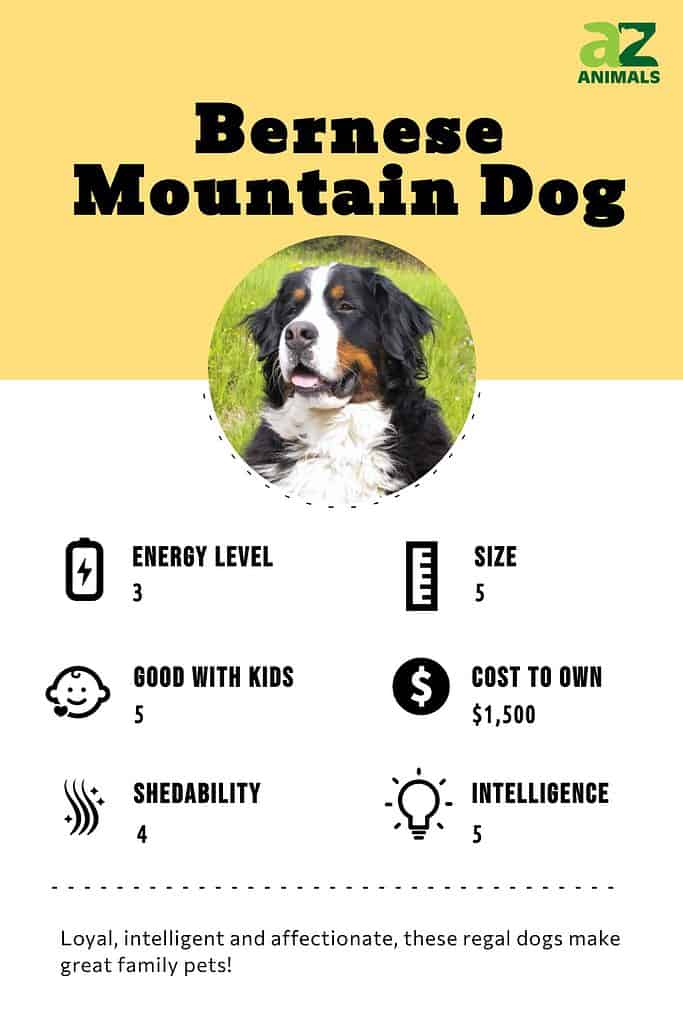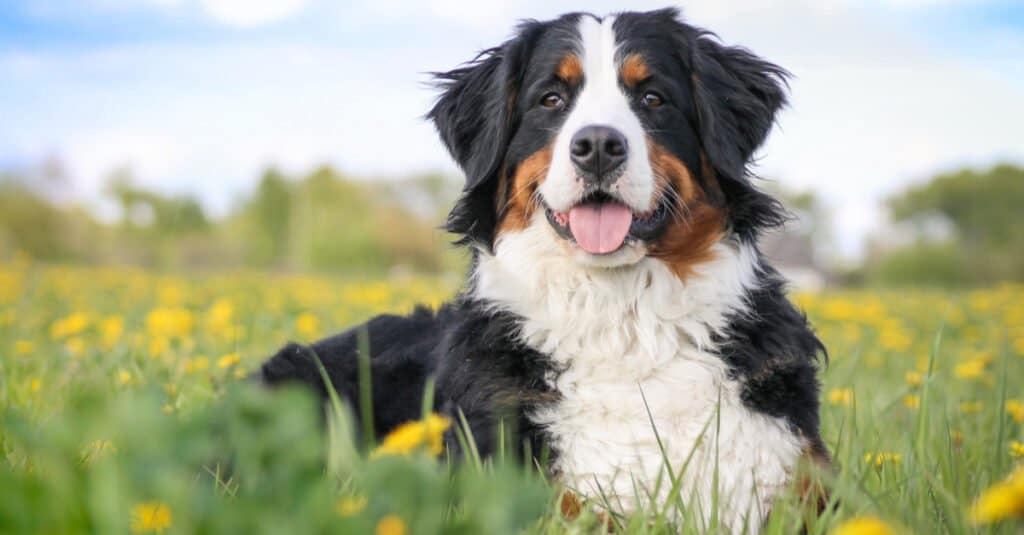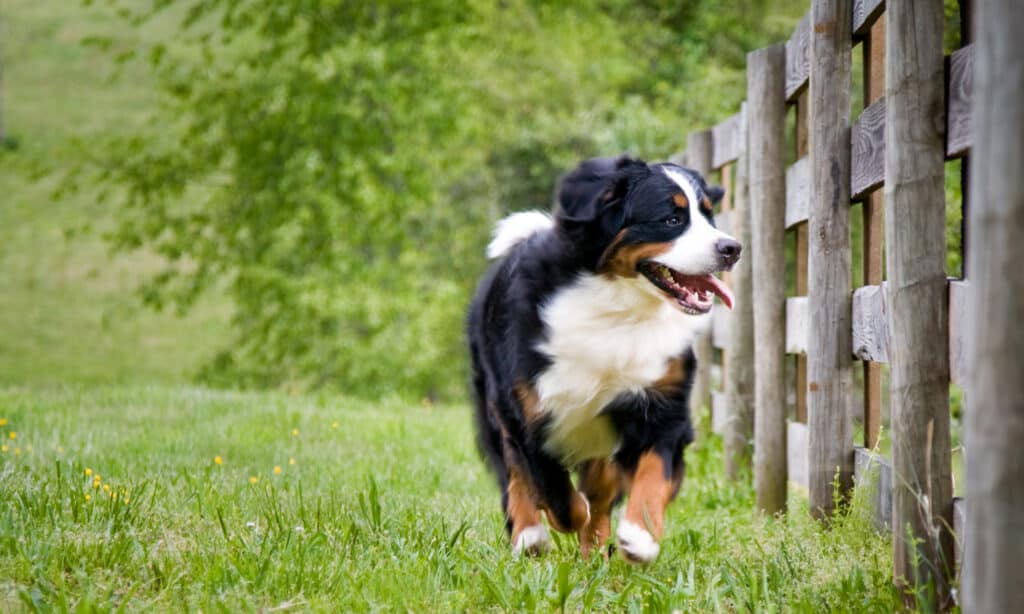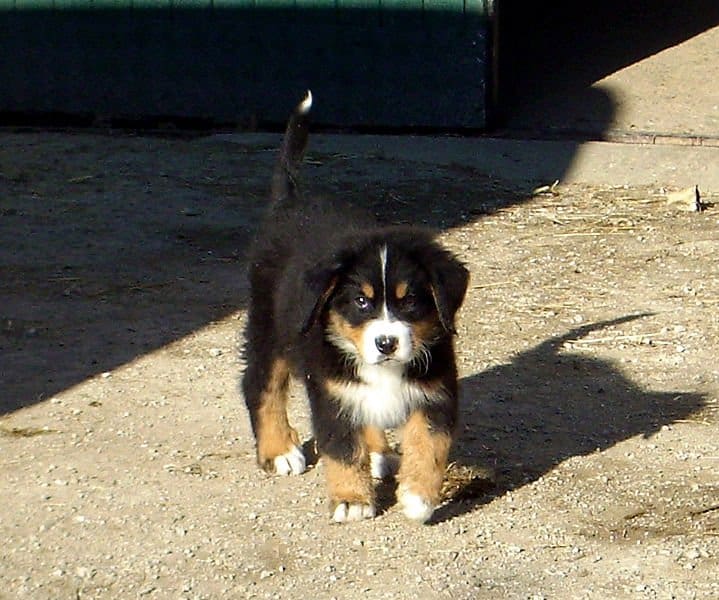Very loyal, faithful and affectionate!
Advertisement
Bernese Mountain Dog Scientific Classification
- Kingdom
- Animalia
- Phylum
- Chordata
- Class
- Mammalia
- Order
- Carnivora
- Family
- Canidae
- Genus
- Canis
- Scientific Name
- Canis Lupus
Read our Complete Guide to Classification of Animals.
Bernese Mountain Dog Conservation Status
Bernese Mountain Dog Facts
- Temperament
- Intelligent, friendly and alert
- Training
- Should be trained from an early age due to their large size
- Diet
- Omnivore
- Average Litter Size
- 7
Bernese Mountain Dog as a Pet:
- General Health
- Energy Level
- Shedability
- Trainability
- Intelligence
- Tendency to Chew
- Size
- Family and kid friendliness
- Yappiness / Barking
- Moderate
- Separation Anxiety
- Moderate
- Preferred Temperature
- Average climate
- Exercise Needs
- Moderate
- Friendly With Other Dogs
- High
- Pure bred cost to own
- $1 150
- Dog group
- Working
- Male weight
- 84-115 lbs
- Female weight
- 79-106 lbs
This post may contain affiliate links to our partners like Chewy, Amazon, and others. Purchasing through these helps us further the A-Z Animals mission to educate about the world's species.
View all of the Bernese Mountain Dog images!
Bernese mountain dogs are large, strong, friendly animals with a lineage dating back 2,000 years.
Reaching 27 inches tall at the shoulder, the Bernese mountain dog is known to be a large and strong animal that comes from the canton of Bern, Switzerland, thus giving it the name. It is covered in a thick, long fur coat which is a mix of three colors — jet black, white, and rust — giving it a royal look. These dogs thrive best in cold weather, which is particularly nice considering the thick layer of fur that they have. They are known to be friendly creatures and get along very well with most families they’re a part of. However, they are known to get attached to one person they are close to.
See all of our expert product reviews.

Evolution
These dogs are extremely hardworking and can be traced back to the farmlands of Switzerland. History says that their ancestors were brought to the Swiss mountains by the Romans around 2,000 years ago. It is said that they were earlier trained to work in farms, pull carts, and herd cattle. Apart from that, they are known to be very loyal and are often useful to become watchdogs for people. They belong to the group of Swiss mountain dogs – one of the four types in that category. However, theirs is the only type that has long hair as a distinct feature. They are usually calm and are known to be obedient and very intelligent. Their high energy levels could often be a problem if you are handling them for the first time.
Owning a Bernese Mountain Dog: 3 Pros and Cons
| Pros! | Cons! |
| Excellent family dog These dogs learn quickly and are incredibly family-focused. Once this breed finds the right owner, it is nearly inseparable from the new family. | Matures slower than other breeds These dogs are known for remaining in a puppy-like mindset for years longer than other breeds. As smart as they are, the habits of this youthful time may be hard to break at the beginning. |
| Highly intelligent From the puppy years to their golden years, these dogs can learn quickly from their owner. Training them is relatively easy, as they will pick up their lessons quickly. | Requires regular grooming While there are many thick-coated and long-hair dog breeds, this dog’s fur will change from one season to the next. Make sure to find a regular groomer or learn to handle the undercoat properly. |
| No special diet required Much like other dogs, the diet of this dog mostly consists of protein, fat, and other nutrients that are found in everyday dry dog food. For a treat, they can eat many different vegetables, making mealtime more fun. | High energy as adults and puppies No matter what age this dog comes home, it will need consistent exercise and walks to prevent restlessness. They are a highly energetic breed and will not thrive without physical activity. |

Bernese Mountain Dogs are wonderful, affectionate, and intelligent dogs.
©Eve Photography/Shutterstock.com
Size and Weight
Known as a dry-mouthed breed of dogs, these animals are muscular and have long hair. The average height of such dogs ranges from 25-27 inches in males and 22-25 inches in females.
While the male dogs from this category usually weigh about 84-115 lbs., the females reach about 79-106 lbs. in size.
Health and Entertainment for your Bernese Mountain Dog
See all of our expert product reviews.
Learn more about the best big dog breeds here.
| Height | Weight |
| Male: 25-27 inches | Male: 84-115 lbs |
| Female: 22-25 inches | Female: 79-106 lbs |
Common Health Issues
These dogs are at an extremely high risk of cancer that could be fatal, more so than other breeds. Studies suggest that the cancer is so severe in these dogs that nearly half of the total population of the breed succumbs to the life-threatening disease. The lifespan of these dogs, therefore, depends a lot on the kind of diseases they are prone to.
Different types of cancers affect the Bernese mountain dog, including mast cell tumor (associated with the mast cells — usually occurring in the skin spleen, liver, or bone marrow), fibrosarcoma (related to fibrous connective tissues), malignant histiocytosis (impacts the lungs and lymph nodes), and osteosarcoma (originates in the cells that are known to help in making bones). Another kind of cancer that is common in the breed is a type of disease that impacts the muscle, known as histiocytic sarcoma.

Bernese mountain dogs are prone to several serious illnesses and need regular veterinary care.
©iStock.com/LightFieldStudios
Apart from cancer, there are multiple types of inherited eye-related problems that affect this community of dogs, including, cataracts, progressive retinal atrophy, hypo myelinogenesis, and hypoadrenocorticism, causing the lifespan of these dogs to be cut short.
These dogs are also prone to death due to musculoskeletal causes like arthritis and hip dysplasia. Cruciate ligament rupture may also be a cause of death among these dogs.
Diseases that most commonly affect the Bernese mountain dog:
- Mast cell tumor
- Fibrosarcoma
- Malignant histiocytosis
- Osteosarcoma
- Histiocytic sarcoma
- Cataracts
- Progressive retinal atrophy
- Hypoadrenocorticism
- Arthritis
- Hip dysplasia
- Cruciate ligament rupture
If adopted as a rescue, the breed may be mixed with other types of dogs as well. Always bring the dog to a veterinarian for a clearer view of its health.

Bernese Mountain dogs are great family dogs with calm dispositions.
©vahamrick/Shutterstock.com
Temperament and Behavior
Originally trained to be a farm dogs that could be used for herding cattle and watchdog purposes, Bernese mountain dogs have now grown to be very popular as home pets and are known to be very compatible with families, especially those with children. Their temperament is known to be very calm. They are known to be very loyal and compatible with the families that they are a part of.
Their behavior is generally calm and composed, and patience is a very prominent personality trait. However, it is also said that these dogs mature relatively slower than the rest of the dog breeds, which could mean that the dog owners might have to deal with puppy-like behavior for a longer period than expected. Since they get attached to one particular member of the family more than others, these traits could often be a problem with young children as larger dogs could knock them over, potentially causing injury. However, their playful nature could be very well accepted by mature adults.
How to Take Care of a Bernese Mountain Dog
Anyone that takes on the responsibility of this breed of dog (even rescue puppies or a mix of this breed and another) must consider their health risks and general demeanor. This breed has a proclivity for developing cancer as one of its main health risks. Plus, with its slow maturing, owners may experience more puppy-like behavior for longer than other breeds.
The Best Dog Food for Bernese Mountain Dogs
Quality food matters for this breed. It is particularly necessary to choose the right kind of food to keep the dog breed up and running in the best health conditions. Bernese mountain dogs have a love of fresh food, enjoying produce like carrots, broccoli, squash, and pumpkin. Many of these foods are excellent sources of digestive enzymes that can soothe their stomach. In lesser amounts, yogurt and lean, cooked meat are acceptable.
Superior quality food also promotes growth in these dogs and makes their bones strong and helps with digestion. Moreover, the right kind of food helps in weight management and helps in preventing injuries or illnesses in dogs. Foods high in fats, fibers, and crude proteins are known to be the best foods for such dogs.
Many low-quality dog foods are highly processed, containing lots of fillers and additives, including artificial colors, flavors, preservatives, and more. Since this breed does have a strong tendency to develop certain cancers, owners may want to choose a less processed raw/freeze-dried food.
Bernese puppies require quality food to grow into strong, mature, and healthy adults. Typically, a Bernese puppy should be fed dry food with about 25 to 27 percent protein and 15 to 16 percent fat.
The best diet for an adult Bernese mountain dog would include natural and homemade foods like meat, grains, and fresh vegetables.
A-Z Animals’ favorite as the best dog food for Bernese Mountain Dogs is Merrick Backcountry Raw Infused Healthy Grains Dry Dog Food.
It takes a lot of food to satisfy a dog as big as a Bernese Mountain Dog and keep it in excellent health. So we think this raw-infused kibble has what these dogs need in terms of taste, satiety, and nutrition. The beef, salmon, chicken, and rice recipe has glucosamine and chondroitin to fortify joints and fiber and probiotics for digestion.
Check Chewy and Amazon for this product.
- Freeze-dried raw coated kibble and raw pieces
- Beef, lamb, and rabbit with wholesome grains
- No peas or lentils
Maintenance and Grooming
Like any other pet, this breed of dog requires grooming from time to time. Maintaining an appropriate nail length shouldn’t take more than a trim every two weeks, which requires a special nail trimmer designed especially for dogs. Pet owners should also brush their dog’s teeth every day. For this purpose, you can look up kits with proper toothpaste and toothbrush for your dog. Because these dogs are accustomed to having thick fur, it is often not advised that you shave your Bernese mountain dog. The thick coat of fur that covers the dogs often poses a problem for the owners as this breed of dog tends to shed their fur heavily twice a year. During these heavy shedding periods, most dogs need to be groomed every four weeks. Between these shedding seasons, the most amount of time these dogs should go is about eight weeks, due to their longer guard coat.

Bernese mountain dogs are extremely sensitive and don’t respond to harsh training methods.
©iStock.com/Dogfest sponsors a 5K race, for the stalwart, as well as 1/2 mile and 1 mile fun runs
Training
Bernese mountain dogs are typically easy to train. However, because they are extremely sensitive, they are usually unlikely to respond to harsh training methods. They are also known to be family-oriented animals and therefore, you should expect to see a change in their behaviors if they are left alone for long periods.
Exercise
Because they are so large, this breed needs moderate amounts of exercise for at least half an hour every day. This would help the animal to stay happy and healthy at the same time. This breed is particularly known for wanting to live indoors, though they are also known to make great company for long treks or hikes. Because of the traits that they might have picked up from their origins, these dogs are very comfortable with pulling carts for children, Some have even been known to participate in carting competitions.
Puppies

Bernese mountain dogs grow fast but tend to remain in the puppy stage mentally for longer than average.
©Wingman, CC BY-SA 3.0, via Wikimedia Commons – License
Adopting a pure-bred or rescue Bernese mountain dog can be exciting, but the first 24 hours are crucial. All puppies are rather curious about their new homes, and they should begin leash training as soon as possible to establish the alpha between pet owner and puppy. Considering how long this dog remains at the puppy stage mentally, be patient, and provide at least 30 minutes of exercise a day. Though small, these puppies have quite an appetite. Though no supplementation should be given to a Bernese puppy at least in the first six months, they will need two meals a day while they grow.
Bernese Mountain Dog and Children
Bernese mountain dogs are known to be great with children. They are affectionate and are usually very playful around kids. However, if there is an infant in the house, special care might need to be taken since the Bernese mountain dogs are huge and can knock over a child unintentionally. Usually, Bernese mountain dogs get attached to one particular member of the family — most likely the children. Overall, these dogs can mix with children at a high level. Learn more about the best dog breeds for families with children here.
Dogs Similar to Bernese Mountain Dog
Various dog breeds are remarkably similar to Bernese mountain dogs, including cross breeds such as the Bernedoodle and the Mini Bernese mountain dog – a cross between a Cavalier King Charles Spaniel and a Bernese mountain dog. Some of them include:
- Greater Swiss Mountain Dog: This breed of dog is particularly similar to the Bernese mountain dogs in appearance as it usually presents the same body fur color as the Berners. It is a strong animal and is usually gentle.
- Anatolian Shepherd: These dogs are courageous powerful and sturdy, much like the Bernese mountain dogs. However, they also differ from the Berners in the sense that they are not very sociable.
- Bullmastiff: This type of dog has a temperament similar to the Bernese mountain dog as it is calm and loyal. It is also great with children and presents a very affectionate behavior towards the family it shares space with.
Popular Names for Bernese Mountain Dogs
The Bernese mountain dogs could have a variety of names. Some of them include:
- Max
- Bella
- Charlie
- Tommy
- Cooper
- Luna
- Scamper
- Apollo
- Astro
- Blue
- Pluto
Famous Bernese Mountain Dogs
With the lovable personality that a Bernese mountain dog exhibits, it has earned many spots in pop culture and Hollywood. Ben Roethlisberger’s dog, Hercules, is a Bernese mountain dog, and he’s resided with the quarterback for over a decade. Michael D. Higgins, the President of Ireland, owned two Bernese mountain dogs as well — Bród and Sioda — though the latter passed in September 2020. This type of dog has been featured on the small screen as well in a TV series called “The New Normal.” The lead characters, Bryan and David (played by Andrew Rannells and Justin Bartha, respectively), gave the dogs the names Smelly and Harvey Milkbone.
View all 285 animals that start with BBernese Mountain Dog FAQs (Frequently Asked Questions)
How much does a Bernese Mountain Dog cost to own?
The cost of a Bernese mountain dog varies from location to location. However, on average, it could cost anything between $800 to $2000. Meanwhile, feeding a Bernese mountain dog could, on average, cost $825 a year.
Is a Bernese Mountain Dog good with kids?
Yes, the Bernese mountain dogs are great with children. They are friendly and are often playful around kids.
How long does a Bernese Mountain Dog live?
A Bernese mountain dog usually lives for 6-8 years.
How much does a Bernese mountain dog weigh?
A male Bernese mountain dog weighs anywhere between 84-115 lbs. while a female Bernese mountain dog weighs anywhere between 79-106 lbs.
How big is a Bernese mountain dog?
A Bernese mountain dog is huge and stands 27 inches tall till its shoulders.
Is a Bernese mountain dog a good family dog?
Yes, Bernese mountain dogs are good family dogs owing to their friendly and affectionate nature.
Why do Bernese mountain dogs have a short lifespan?
Their short lifespan could be related to a host of diseases that the Bernese mountain dogs are prone to.
Are Bernese Mountain Dogs herbivores, carnivores, or omnivores?
Bernese Mountain Dogs are Omnivores, meaning they eat both plants and other animals.
What Kingdom do Bernese Mountain Dogs belong to?
Bernese Mountain Dogs belong to the Kingdom Animalia.
What class do Bernese Mountain Dogs belong to?
Bernese Mountain Dogs belong to the class Mammalia.
What phylum to Bernese Mountain Dogs belong to?
Bernese Mountain Dogs belong to the phylum Chordata.
What family do Bernese Mountain Dogs belong to?
Bernese Mountain Dogs belong to the family Canidae.
What order do Bernese Mountain Dogs belong to?
Bernese Mountain Dogs belong to the order Carnivora.
What genus do Bernese Mountain Dogs belong to?
Bernese Mountain Dogs belong to the genus Canis.
What type of covering do Bernese Mountain Dogs have?
Bernese Mountain Dogs are covered in Hair.
How many babies do Bernese Mountain Dogs have?
The average number of babies a Bernese Mountain Dog has is 7.
What is an interesting fact about Bernese Mountain Dogs?
Bernese Mountain Dogs are very loyal, faithful, and affectionate!
What is the scientific name for the Bernese Mountain Dog?
The scientific name for the Bernese Mountain Dog is Canis Lupus.
What's the difference between a Bernese Mountain Dog and a Newfoundland?
The Newfoundland is larger than the Bernese Mountain Dog in both height and weight. Additionally, the Bernese Mountain Dog is from Switzerland, while the Newfoundland is from Canada.
What's the difference between a Bernese Mountain Dog and the Greater Swiss Mountain Dog?
The Greater Swiss Mountain Dog is larger than the Bernese Mountain Dog, and the Bernese has a shorter lifespan than the Greater Swiss.
What's the difference between a St. Bernard and a Bernese Mountain Dog ?
The key differences between Saint Bernard and the Bernese Mountain Dog (a.k.a. Berner) are size, appearance, lifespan, origin, and temperament.
Saint Bernards are frequently larger and heavier than Bernese mountain dogs. Additionally, while Saint Bernard and Bernese mountain dogs are related, their origin is distinct. For instance, Saint Bernard originated in the Western Alps of Italy and Switzerland, but the Berner originated in the Berne region of Switzerland.
What are the key differences between Bernese Mountain Dogs and Australian Shepherds?
The key differences between Bernese Mountain Dogs and Australian Shepherds are size, appearance, fur, lifespan, trainability, grooming difficulty, shedding level, and drooling level.
What are the key differences between Bernese Mountain Dogs and Great Pyrenees?
The main difference between a Bernese Mountain Dog and the Great Pyrenees is fur color. Other differences include size, lifespan, temperament, energy level, trainability, grooming needs, and shedding level.
Thank you for reading! Have some feedback for us? Contact the AZ Animals editorial team.
Sources
- Wikipedia, Available here: https://en.wikipedia.org/wiki/Bernese_Mountain_Dog
- Chewy, Available here: https://petcentral.chewy.com/behavior-breeds-bernese-mountain-dog-breed/
- Rover, Available here: https://www.rover.com/blog/best-dog-foods-for-bernese-mountain-dogs/
- Bernese Love, Available here: https://www.berneselove.com/how-to-feed-your-bernese-mountain-dog-right/
- Wahl, Available here: https://wahlusa.com/pet-grooming/product-selector/dog/breed/bernese-mountain-dog
- Alaska Dog Works, Available here: https://alaskadogworks.com/how-to-train-a-bernese-mountain-dog/
- PDSA, Available here: https://www.pdsa.org.uk/taking-care-of-your-pet/looking-after-your-pet/puppies-dogs/large-dogs/bernese-mountain-dog
- , Available here: https://www.mydogsname.com/bernese-mountain-dog-price/
- , Available here: https://www.yourpurebredpuppy.com/reviews/bernesemountaindogs.html
- American Kennel Club, Available here: https://www.akc.org/dog-breeds/bernese-mountain-dog/
- Dog Time, Available here: https://dogtime.com/dog-breeds/bernese-mountain-dog#/slide/1
- Animal Planet, Available here: http://www.animalplanet.com/breed-selector/dog-breeds/working/bernese-mountain-dog.html


















